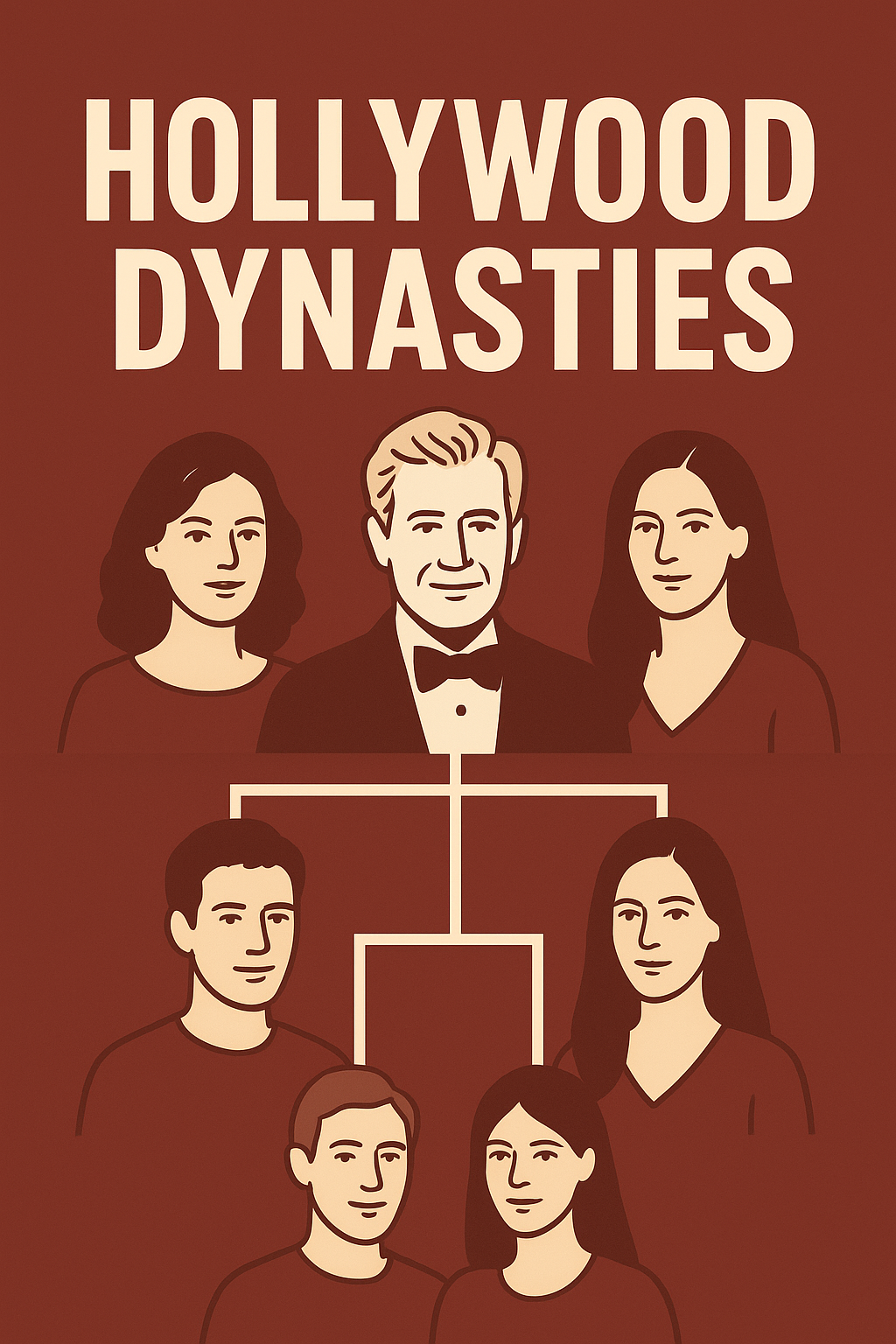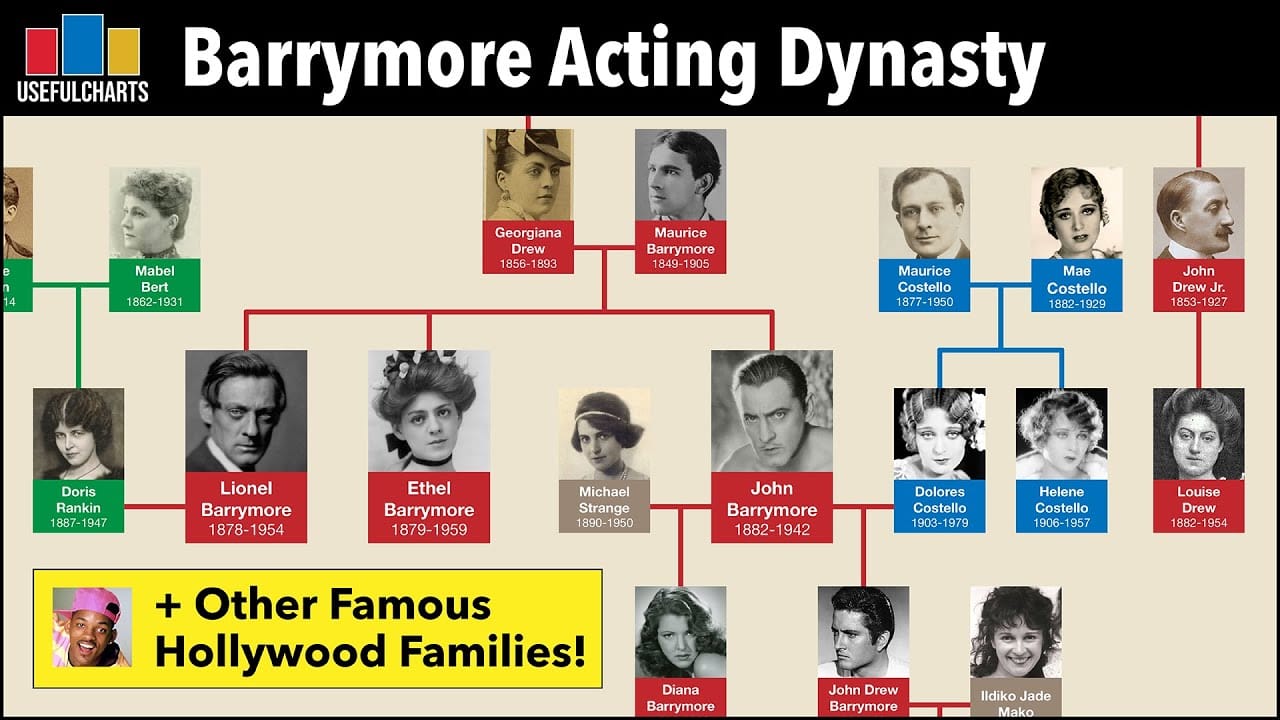Hollywood Dynasties: How Family Legacies Shape the Entertainment Industry
Explore the powerful influence of Hollywood dynasties like the Barrymores, Coppolas, and Fondas on film & TV. Uncover the blend of talent & privilege shaping the entertainment industry. Why are we so captivated by celebrity families?

Written by Lavanya, Intern, Allegedly The News
From the flickering black and white images of the silent era to the high-definition streams of today, the entertainment industry has been indelibly marked by the enduring power of family legacies. These Hollywood dynasties are more than just a collection of famous individuals sharing a surname; they represent intricate tapestries of influence, opportunity, and artistic inheritance that have shaped the very fabric of film and television for over a century.
Genesis of Glamour: Tracing the Family Tree (Late 19th Century - 1940s)
The concept of the Hollywood dynasty didn't materialize overnight on a studio backlot; its roots lie firmly planted in the fertile ground of the late 19th and early 20th-century American theatrical landscape. The Barrymore family stands as a foundational example, often hailed as the "Royal Family of the American Theater." Patriarch Maurice Barrymore and his wife, Georgiana Drew Barrymore, laid the theatrical groundwork for their three illustrious children: Lionel, Ethel, and John Barrymore. Their collective talent and charismatic stage presence captivated audiences, and as the burgeoning film industry began to draw talent from the stage, the Barrymores naturally transitioned to the silver screen. John Barrymore, with his matinee idol looks and acclaimed performances in films like Dr. Jekyll and Mr. Hyde (1920) and Don Juan (1926), became a major star, solidifying the family's presence in this new medium. Lionel Barrymore garnered acclaim for his character roles and won an Academy Award for Free Soul (1931), while Ethel Barrymore became a celebrated stage and screen actress, earning an Oscar for None but the Lonely Heart (1944). Their early success established a powerful precedent: a recognized family name could indeed pave the way for opportunities in the entertainment industry. However, this early dynasty also foreshadowed the intense public scrutiny that would become an inseparable aspect of Hollywood families, a cycle that John's granddaughter, Drew Barrymore, would later experience with intense media attention surrounding her personal life from a very young age.
Timeline Snapshot: The Barrymore Legacy
- 1870s-1910s: Maurice and Georgiana Drew Barrymore establish their theatrical careers, laying the foundation for their children.
- 1910s-1940s: Lionel, Ethel, and John Barrymore achieve stardom on stage and in early Hollywood cinema.
- 1931 & 1944: Lionel and Ethel Barrymore win Academy Awards, cementing the family's critical acclaim.
- Late 20th Century Onward: Descendants like Drew Barrymore navigate the pressures and opportunities of the family name in contemporary Hollywood.

The Golden Age and the Rise of New Lineages (1950s - 1970s)
The mid-20th century witnessed the consolidation of Hollywood as a global force and the emergence of new, powerful family dynasties. The Fonda family provides a compelling case study in how a foundational legacy can evolve and branch out across generations. Henry Fonda, an actor renowned for his integrity and portrayal of iconic American characters in films such as The Grapes of Wrath (1940) and 12 Angry Men (1957), established a strong presence in the industry. His children, however, did not simply replicate his career path; they actively sought to define their own identities, often in ways that diverged significantly from their father's more conservative image. Jane Fonda became a two-time Academy Award winner for Klute (1971) and Coming Home (1978) and a prominent, often controversial, political activist. Peter Fonda, on the other hand, became a symbol of the counterculture movement with his iconic role in and co-production of the groundbreaking film Easy Rider (1969). Their respective careers illustrate a key dynamic within Hollywood dynasties: while the family name provides an initial advantage, subsequent generations often face the challenge of forging their own distinct identities and artistic voices, sometimes in direct reaction to the established legacy.
This era also saw the ascent of one of the most artistically influential and commercially successful dynasties in Hollywood history: the Coppola family. Francis Ford Coppola, a visionary director who revolutionized filmmaking with masterpieces like The Godfather (1972), The Godfather Part II (1974), and Apocalypse Now (1979), created a powerful gravitational pull that drew in and nurtured the talents of his relatives. His sister, Talia Shire, achieved significant recognition for her role as Connie Corleone in The Godfather trilogy and as Adrian Balboa in the Rocky series. Francis Ford Coppola's children have also made significant marks on the industry. His daughter, Sofia Coppola, has established herself as an acclaimed writer and director, winning an Academy Award for Best Original Screenplay for Lost in Translation (2003) and earning nominations for Best Director. His son, Roman Coppola, has worked as a screenwriter and director, often collaborating with his sister and father. Furthermore, Francis Ford Coppola's nephew, Nicolas Cage (born Nicolas Kim Coppola), deliberately changed his name early in his career to avoid the perception of nepotism, yet he went on to achieve considerable success and won an Academy Award for Leaving Las Vegas (1995), demonstrating that while the family connection exists, individual talent can ultimately dictate long-term success. The Coppola family saga exemplifies the complex interplay within dynasties: the presence of a powerful figure can provide unparalleled opportunities and creative collaborations, but it also creates immense pressure for subsequent generations to live up to or diverge from the established artistic standards.
Timeline Snapshot: The Fonda & Coppola Legacies
- 1940s-1960s: Henry Fonda establishes himself as a major Hollywood star.
- 1960s-1970s: Jane and Peter Fonda emerge as significant cultural figures and actors.
- 1970s: Francis Ford Coppola's Godfather films redefine American cinema.
- 1970s Onward: Talia Shire gains recognition for her roles in iconic film franchises.
- 1990s-2000s: Sofia and Roman Coppola establish their careers as filmmakers; Nicolas Cage achieves stardom and Oscar recognition.
The Television Boom and Modern Family Trees (1980s - Present)
As television evolved from a secondary medium to a dominant force in entertainment, new family legacies emerged, shaping popular culture and influencing consumer trends in profound ways. The Olsen twins, Mary-Kate and Ashley, provide a fascinating case study in the transition from child stardom to entrepreneurial empire-building. Beginning their careers at a mere nine months old by sharing the role of Michelle Tanner on the popular sitcom Full House (1987-1995), they parlayed their on-screen popularity into a vast array of merchandise, effectively creating a multimedia brand before reaching adolescence. Their company, Dualstar Entertainment, became a massive success, encompassing films, television shows, and a wide range of consumer products. As they matured, the Olsen twins transitioned away from acting and established themselves as respected figures in the high-fashion world with their luxury brand The Row, demonstrating a remarkable ability to reinvent themselves and leverage their early fame into long-term business success. Their journey highlights the multifaceted nature of modern Hollywood legacies, extending beyond traditional acting and directing roles into the realms of branding, production, and entrepreneurship. However, their intensely private lives also underscore the significant personal challenges that can accompany early and sustained public exposure.
The Arquette and Deschanel families represent other prominent examples of multigenerational success in contemporary Hollywood, showcasing a diversity of talents and career paths within a shared familial foundation. The Arquette siblings – Rosanna, Patricia, Richmond, Alexis (who sadly passed away in 2016), and David – have collectively amassed an impressive body of work across film and television. Their father, Lewis Arquette, was also an actor, and their grandfather, Cliff Arquette, was a comedic actor, establishing a clear lineage within the performing arts. Patricia Arquette's Academy Award win for Best Supporting Actress for Boyhood (2014) and her acclaimed work in television series like Medium and Severance have further solidified the family's reputation for talent and versatility. Their continued presence across various genres and mediums speaks to a deeply ingrained passion for acting and storytelling within the family. Similarly, the Deschanel sisters, Emily and Zooey, have both achieved significant success in television. Emily Deschanel starred for twelve seasons in the popular crime procedural Bones, while Zooey Deschanel gained widespread recognition for her lead role in the sitcom New Girl and her indie film work. Their father, Caleb Deschanel, is a highly respected cinematographer with multiple Academy Award nominations, illustrating how creative talent can manifest in different but related aspects of the filmmaking process within a family. These modern dynasties demonstrate the enduring power of familial influence in Hollywood, even as the industry undergoes rapid transformations.
Timeline Snapshot: The Olsen, Arquette & Deschanel Legacies
- 1987-1995: Mary-Kate and Ashley Olsen gain fame on Full House, launching their media empire.
- 1980s-Present: The Arquette siblings establish diverse and successful acting careers.
- 2014: Patricia Arquette wins an Academy Award for Boyhood.
- 2000s-Present: Emily Deschanel stars in Bones, and Zooey Deschanel stars in New Girl.
- Ongoing: The Olsen twins transition to fashion moguls with The Row.
The Great Debate: Nature, Nurture, and the Hollywood Star
The enduring allure of Hollywood dynasties compels us to confront a fundamental question that has been debated for generations: To what extent is their success attributable to inherent talent passed down through genes, and how much is due to the undeniable advantages of privilege and access afforded by their family name? The reality, as is often the case with complex social phenomena, is a nuanced and often inextricably linked combination of both.
The Irrefutable Force of Privilege
It is impossible to ignore the significant advantages conferred by being born into a Hollywood dynasty. In an industry notoriously difficult to break into, the "nepo baby," as they are often referred to, inherits a network of connections that aspiring actors and filmmakers can only dream of. Access to influential agents, producers, directors, and casting opportunities is often a direct byproduct of their family ties. They may not have to endure years of struggling to get their foot in the door; instead, meetings and auditions can be facilitated simply because of their surname. This inherited social capital provides a substantial head start that is simply unavailable to those from outside the industry. For every Francis Ford Coppola who mentors his daughter Sofia, there are countless talented independent filmmakers struggling to secure funding and distribution for their projects. The inherent imbalance in opportunity is a persistent critique leveled against Hollywood dynasties, with many arguing that their continued prominence contributes to a lack of diversity and perpetuates a system where success is often predicated on who you know rather than solely on merit. As one anonymous industry insider noted, "It's not that these kids are all untalented, but the number of doors that automatically open for them is staggering. It's a completely different playing field."
The Inescapable Demand for Talent
While a famous name can undoubtedly open initial doors, it cannot guarantee a sustained and successful career in the fiercely competitive entertainment industry. Ultimately, audiences and critics serve as the final arbiters of talent. An actor who consistently delivers subpar performances, regardless of their lineage, will eventually find their opportunities dwindling. Nicolas Cage's deliberate decision to change his last name early in his career, despite his familial connection to the Coppolas, suggests an awareness of the potential pitfalls of nepotism and a desire to be judged on his own merits. His subsequent Academy Award win for Leaving Las Vegas serves as a powerful testament to his individual talent and dedication to his craft. Similarly, Sofia Coppola's critical acclaim and Oscar win for Lost in Translation were earned through her distinct cinematic vision and storytelling abilities, not solely by virtue of her father's reputation. The pressure on individuals within Hollywood dynasties to prove their worth and step out of the shadow of their famous relatives can be immense. They often face heightened scrutiny and expectations, with their successes and failures amplified by their family connections. As Jane Fonda once stated, "Being Henry Fonda's daughter both opened doors and created enormous pressure. I felt I had to prove myself, and sometimes that meant going in a completely different direction."

The Enduring Fascination: Decoding Our Obsession with Hollywood Families
Our enduring fascination with Hollywood dynasties taps into a confluence of deep-seated human desires and cultural narratives. It's a modern iteration of our historical fascination with royalty and inherited power, transposed onto the glittering stage of the entertainment industry. We see these families as embodying a kind of celebrity aristocracy, their lives unfolding in a realm of glamour and high stakes that simultaneously feels both aspirational and relatable.
Their stories often mirror classic fairytale tropes of inherited destiny. We watch as the children of famous actors and directors navigate the expectations and burdens of their lineage, often grappling with the pressure to live up to or rebel against their parents' achievements. Their public struggles with addiction, personal relationships, and professional setbacks become fodder for public consumption, fostering a sense of voyeuristic intimacy. When a scion of a famous family achieves significant success, it reinforces the narrative of talent being passed down through generations, seemingly validating our belief in both nature and destiny. Conversely, when they stumble or fail to live up to expectations, it fuels the debate about privilege versus meritocracy, providing endless fodder for discussion and critique.
Moreover, these families often become intertwined with iconic moments in film and television history. The Barrymores in early cinema, the Fondas in classic American dramas and counterculture films, and the Coppolas in groundbreaking New Hollywood cinema are all inextricably linked to pivotal moments in the evolution of storytelling. Following their familial connections allows us to trace the development of cinematic styles, genres, and industry trends across generations, providing a unique lens through which to understand the history of the moving image. Ultimately, the enduring appeal of Hollywood dynasties lies in their ability to personalize the vast and often impersonal machinery of the entertainment industry, offering us intimate glimpses into the human drama that unfolds behind the scenes of our favorite movies and television shows.
Looking Ahead: The Future of Hollywood Lineages
As the entertainment industry continues its rapid evolution in the digital age, the dynamics of Hollywood dynasties are also undergoing significant transformations. The erosion of the traditional studio system and the rise of independent content creation and online platforms have arguably democratized access to some extent. However, the fundamental advantages of inherited networks, financial resources, and industry know-how are likely to persist, albeit in new forms. The intense scrutiny brought about by social media and the ongoing "nepo baby" discourse suggests a growing public awareness of the role of privilege in Hollywood, potentially creating pressure for greater transparency and accountability. The next generation of Hollywood heirs will undoubtedly face the challenge of navigating this evolving landscape, balancing the opportunities afforded by their lineage with the need to establish their own distinct identities and earn recognition based on their individual talents. The story of Hollywood dynasties is far from over; it is a continuing saga that reflects our complex relationship with fame, family, and the ever-enthralling world of entertainment.
Behind the Screen: Questions for Our Audience
Do you believe the children of famous Hollywood figures face more pressure or have more advantages in their careers? Share your thoughts in the comments below! Which Hollywood dynasty's story do you find most compelling, and why? Let's discuss!
Sources
- Barrymore Family: Kobal, J. (1981). The Barrymores. Crown Publishers.
- Fonda Family: многочисленные биографии Henry, Jane, and Peter Fonda, а также документальные фильмы об их жизни и карьерах.
- Coppola Family: Biskind, P. (1998). Easy Riders, Raging Bulls: How the Sex-Drugs-and-Rock 'n' Roll Generation Saved Hollywood. Simon & Schuster. многочисленные интервью и статьи о Francis Ford Coppola, Sofia Coppola, и Nicolas Cage.
- Olsen Twins: многочисленные статьи в Forbes, The Business of Fashion, и других деловых и модных изданиях об их карьере и бизнесе.
- Arquette Family & Deschanel Sisters: многочисленные интервью в различных развлекательных изданиях и онлайн-платформах.




